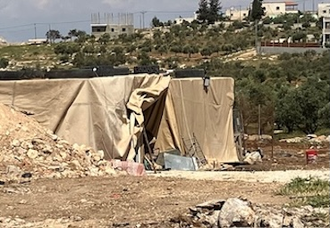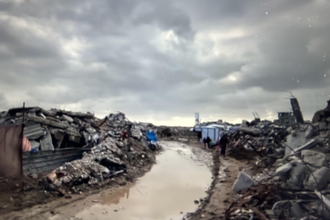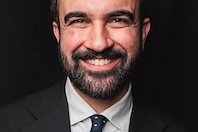Letter from the Holy Land - 1

Tent the family live in now.
Melanie Nazareth has recently returned from Israel and occupied Palestine where she spent two and a half months with the Ecumenical Accompaniment Programme in Palestine and Israel. She writes:
I want to start with the story of Ahmed whose life changed on 14th February 2025.
Ahmed and his family were part of a desert community of 11 families.
Nearby to their homes lie two Israeli settlements, and the extremist settler group "Hilltop Youth" had also established an illegal outpost on the village's land. Since October 7, 2023, harassment had been increasing and settlers had killed Ahmad's sheep, burned parts of his house, sabotaged water pipes and stolen the family's water tanks.
The head of the village council confirms that on February 13 this year, to mark Tu B'Shvat, the Jewish New Year of the Trees, Israel's Minister of National Security, Itamar Ben-Gvir, now sanctioned by the UK Government for repeated incitements of violence against Palestinian communities, came to the village to plant trees,. Those trees were planted on Ahmed's land. "I can't see it any other way than that he approves of the settlers' attempts to take my land," Ahmed says.
Ahmed relates how, in the early morning on the day after Ben-Gvir's planting, he saw about 50 settlers starting to move towards his land. He identifies some of them as part of the "Hilltop Youth." The group is often mentioned by local farmers and shepherds who say they are regularly harassed by them. He made some calls, and a hour later Israeli police and military arrived to see what was happening. They told Ahmed that he was safe because the settlers were still about 150 meters away and left, but as soon as the soldiers went, Ahmed saw settlers closing in. Ahmed continues, describing how armed with guns and dogs, they entered his house, threw stones at his car and house and at his family and others in the community, destroyed solar panels and burnt cars. Their dogs attacked. A woman who was five months pregnant was injured and later lost her baby. A total of fifteen people were injured, six of whom required hospital treatment. The police and soldiers returned only after the attack. They assured Ahmed that they would return later to protect him and his family from further attacks during the evening and night, but they did not. At 2 am, a larger group of settlers again attacked Ahmed's land and house. Ahmed has phone footage of men running down a hillside in the desert towards the camera lens. Ahmed says he took his family and fled to his father's house in the nearby village and that the military did not return until the morning.
His story carries on. The next day Ahmed's family members went to his house to collect the family's belongings. School bags, a sofa, and chairs were among the first things to arrive, but as the truck was being unloaded, Ahmed learned that the settlers were returning. Despite their previous warning that if he returned they would kill not only his sheep but also his children, he rushed off himself to collect the last of the family's belongings. That day his house was set on fire and Ahmed watched it burn.
Sometimes he goes back to just to look. Two weeks after the first attack, the walls of his house were also gone.
When we met Ahmed, his wife and two of their children a month after that, the family was living in a tent on his father's land. Ahmed now had to buy feed for the animals he brought with him as he did not have anywhere to graze his animals. "How am I to afford this when there is no work?" he asked, obviously not expecting any meaningful answer. He told us that the other 10 families had now left the hamlet because they were too scared to stay. Their land will likely be taken because their is no one there to assert a right to it. His wife told us that it was the children she was most worried about. They had a slide outside their house, where the children played. They just kept asking to go home. We asked Ahmed's 9 and 6 year old daughters what they missed most and they said "everything".
BADIL Resource Center for Palestinian Residency and Refugee Rights told us that according to figures from their most recent research, two thirds of Palestinians globally, some 9.76 million human beings, are refugees or internally displaced people. Many have been displaced more than once, many of those have been displaced multiple times. Some are displaced through armed force and violence and some by the creation of a coercive environment. Both ways of displacing people from their land are unlawful under international law, because they breach a number of human rights, including the rights to freedom of movement and choice of residence, the right to respect for the home and for privacy, the right to an adequate standard of living, including food and housing, and the right to respect for the family. States have a responsibility to protect human rights and to take measures to ensure that they are not violated. Under the Universal Declaration of Human Rights, Ahmed has fundamental right to life, liberty and security of person.
This Easter season I have been greeting my Christian friends with the words 'Christ is risen, He is risen indeed'. But as I think of Ahmed and his family, I am more drawn to words of the cross, Eloi, Eloi, lama sabachthani. I wonder if collectively we, the instruments of God's work on this earth, have allowed him to be forsaken.
LINKS
BADIL Resource Center for Palestinian Residency and Refugee Rights: https://badil.org
Ecumenical Accompaniment Programme in Palestine and Israel: www.quaker.org.uk/action/palestine-and-israel/eappi


















